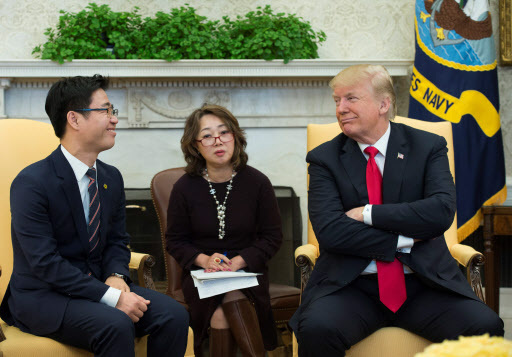Trump’s emphasis on NK human rights prelude to more pressure: experts
By Ock Hyun-juPublished : Feb. 4, 2018 - 18:22
US President Donald Trump’s emphasis on North Korea’s human rights issues is a sign that Washington will step up its “maximum pressure” on the regime, experts said Sunday.

Despite a thaw in inter-Korean relations, the US is seen as shifting to a tougher stance on North Korea by addressing the brutality of its leader Kim Jong-un -- a provocative action that could enrage the communist state.
With just a week before the PyeongChang Winter Olympics begin in the South, Trump met with six North Korean defectors at the White House on Friday to highlight the human rights abuses under the communist regime.
During his State of the Union address on Tuesday, Trump singled out a former political prisoner and amputee Ji Seong-ho, who escaped from the North in 2006, saying “No regime has oppressed its own citizens more totally or brutally than the cruel dictatorship in North Korea.”
While addressing human rights violations in North Korea has traditionally been part of the US’ North Korea policy, bringing up the issue at a sensitive time when two Koreas are engaging in dialogue sends a message to both Koreas, an expert said.
“It is a strong message to North Korea that there will not be dialogue for the sake of having dialogue,” Kim Hyun-wook, professor at the Korea National Diplomatic Academy, told The Korea Herald. “It is a warning to Pyongyang that the US will continue to push for a hard-line policy on it unless it stops nuclear and missile provocations.”
There are concerns that North Korea may be using improved ties with the South to ease US-led international sanctions on the regime and buy time to perfect its nuclear and missile programs.
“It could be also meant to say to South Korea that it is not comfortable about inter-Korean dialogue without a (tangible) result,” he added.
Trump spoke to South Korean President Moon Jae-in by phone Friday and reaffirmed their commitment to address human rights abuses in North Korea, the White House said.
The Trump administration has led a “maximum pressure” campaign against Pyongyang through multi-layered economic and diplomatic sanctions to convince it to come to a negotiating table on its nuclear disarmament.
While joining the sanctions regime, Seoul has sought to expand inter-Korean exchanges through the PyeongChang Winter Olympics and use the “peace” momentum to pave the way for talks between North Korea and the US.
During the phone conversation with Trump, Moon reportedly expressed hope that the inter-Korean reconciliatory mood from the Olympics will help build peace on the Korean Peninsula.
But the prospects of North Korea-US dialogue appear grim for now, Kim said.
“The recent developments put South Korea at a difficult position. In the middle, it should try to find a common ground between North Korea and the US,” he said.
“At the same time, it should be prepared for various scenarios -- for example, how it will respond to North Korea’s reaction to South Korea-US joint military drills expected to resume after the Olympics.”
Koh Yu-hwan, a North Korea expert at Dongguk University, agreed that the US touching on the North Korea’s internal human rights problems is in line with its maximum pressure campaign.
North Korea is highly sensitive to the international community addressing its human rights situation because the communist state sees it as a threat to its regime’s survival, he added.
“Human rights problems are linked to democratization. Given that North Korea would not easily give up its nuclear weapons program, I think the US is seeking to continue its sanctions regime and put external pressure on North Korea to trigger democracy from within,” he said.
Koh did not rule out a possibility of North Korea-US dialogue following the Olympics next month.
“The problem is that North Korea has no determination to give up its nuclear weapons program. If the US could agree to partially freezing the North’s nuclear programs, talks between them could take place,” he said.
The increasing pressure on North Korea also comes amid speculations that the Trump administration is seriously considering a limited military strike on North Korea. News reports suggested that its nominee for US ambassador to South Korea --Victor Cha – was dropped due to his disagreement with Trump on the “bloody nose” strategy.
The Trump administration denied the reports, saying it favors a “diplomatic” way of tackling the nuclear standoff.
(laeticia.ock@heraldcorp.com)
-
Articles by Ock Hyun-ju









![[Kim Seong-kon] Democracy and the future of South Korea](http://res.heraldm.com/phpwas/restmb_idxmake.php?idx=644&simg=/content/image/2024/04/16/20240416050802_0.jpg&u=)








![[KH Explains] Hyundai's full hybrid edge to pay off amid slow transition to pure EVs](http://res.heraldm.com/phpwas/restmb_idxmake.php?idx=652&simg=/content/image/2024/04/18/20240418050645_0.jpg&u=20240418181020)

![[Today’s K-pop] Zico drops snippet of collaboration with Jennie](http://res.heraldm.com/phpwas/restmb_idxmake.php?idx=642&simg=/content/image/2024/04/18/20240418050702_0.jpg&u=)